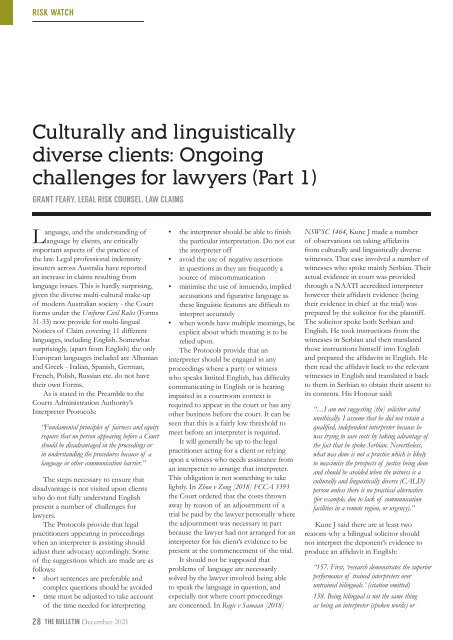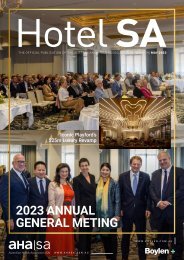LSB December 2021 HR
Create successful ePaper yourself
Turn your PDF publications into a flip-book with our unique Google optimized e-Paper software.
RISK WATCH<br />
Culturally and linguistically<br />
diverse clients: Ongoing<br />
challenges for lawyers (Part 1)<br />
GRANT FEARY, LEGAL RISK COUNSEL, LAW CLAIMS<br />
Language, and the understanding of<br />
language by clients, are critically<br />
important aspects of the practice of<br />
the law. Legal professional indemnity<br />
insurers across Australia have reported<br />
an increase in claims resulting from<br />
language issues. This is hardly surprising,<br />
given the diverse multi-cultural make-up<br />
of modern Australian society - the Court<br />
forms under the Uniform Civil Rules (Forms<br />
31-33) now provide for multi-lingual<br />
Notices of Claim covering 11 different<br />
languages, including English. Somewhat<br />
surprisingly, (apart from English) the only<br />
European languages included are Albanian<br />
and Greek - Italian, Spanish, German,<br />
French, Polish, Russian etc. do not have<br />
their own Forms.<br />
As is stated in the Preamble to the<br />
Courts Administration Authority’s<br />
Interpreter Protocols:<br />
“Fundamental principles of fairness and equity<br />
require that no person appearing before a Court<br />
should be disadvantaged in the proceedings or<br />
in understanding the procedures because of a<br />
language or other communication barrier.”<br />
The steps necessary to ensure that<br />
disadvantage is not visited upon clients<br />
who do not fully understand English<br />
present a number of challenges for<br />
lawyers.<br />
The Protocols provide that legal<br />
practitioners appearing in proceedings<br />
when an interpreter is assisting should<br />
adjust their advocacy accordingly. Some<br />
of the suggestions which are made are as<br />
follows:<br />
• short sentences are preferable and<br />
complex questions should be avoided<br />
• time must be adjusted to take account<br />
of the time needed for interpreting<br />
• the interpreter should be able to finish<br />
the particular interpretation. Do not cut<br />
the interpreter off<br />
• avoid the use of negative assertions<br />
in questions as they are frequently a<br />
source of miscommunication<br />
• minimise the use of innuendo, implied<br />
accusations and figurative language as<br />
these linguistic features are difficult to<br />
interpret accurately<br />
• when words have multiple meanings, be<br />
explicit about which meaning is to be<br />
relied upon.<br />
The Protocols provide that an<br />
interpreter should be engaged in any<br />
proceedings where a party or witness<br />
who speaks limited English, has difficulty<br />
communicating in English or is hearing<br />
impaired in a courtroom context is<br />
required to appear in the court or has any<br />
other business before the court. It can be<br />
seen that this is a fairly low threshold to<br />
meet before an interpreter is required.<br />
It will generally be up to the legal<br />
practitioner acting for a client or relying<br />
upon a witness who needs assistance from<br />
an interpreter to arrange that interpreter.<br />
This obligation is not something to take<br />
lightly. In Zhou v Zong [2018] FCCA 3393<br />
the Court ordered that the costs thrown<br />
away by reason of an adjournment of a<br />
trial be paid by the lawyer personally where<br />
the adjournment was necessary in part<br />
because the lawyer had not arranged for an<br />
interpreter for his client’s evidence to be<br />
present at the commencement of the trial.<br />
It should not be supposed that<br />
problems of language are necessarily<br />
solved by the lawyer involved being able<br />
to speak the language in question, and<br />
especially not where court proceedings<br />
are concerned. In Rogic v Samaan [2018]<br />
NSWSC 1464, Kunc J made a number<br />
of observations on taking affidavits<br />
from culturally and linguistically diverse<br />
witnesses. That case involved a number of<br />
witnesses who spoke mainly Serbian. Their<br />
actual evidence in court was provided<br />
through a NAATI accredited interpreter<br />
however their affidavit evidence (being<br />
their evidence in chief at the trial) was<br />
prepared by the solicitor for the plaintiff.<br />
The solicitor spoke both Serbian and<br />
English. He took instructions from the<br />
witnesses in Serbian and then translated<br />
those instructions himself into English<br />
and prepared the affidavits in English. He<br />
then read the affidavit back to the relevant<br />
witnesses in English and translated it back<br />
to them in Serbian to obtain their assent to<br />
its contents. His Honour said:<br />
“…I am not suggesting [the] solicitor acted<br />
unethically. I assume that he did not retain a<br />
qualified, independent interpreter because he<br />
was trying to save costs by taking advantage of<br />
the fact that he spoke Serbian. Nevertheless,<br />
what was done is not a practice which is likely<br />
to maximise the prospects of justice being done<br />
and should be avoided when the witness is a<br />
culturally and linguistically diverse (CALD)<br />
person unless there is no practical alternative<br />
(for example, due to lack of communication<br />
facilities in a remote region, or urgency).”<br />
Kunc J said there are at least two<br />
reasons why a bilingual solicitor should<br />
not interpret the deponent’s evidence to<br />
produce an affidavit in English:<br />
“157. First, ‘research demonstrates the superior<br />
performance of trained interpreters over<br />
untrained bilinguals.’ (citation omitted)<br />
158. Being bilingual is not the same thing<br />
as being an interpreter (spoken words) or<br />
28<br />
THE BULLETIN <strong>December</strong> <strong>2021</strong>


















